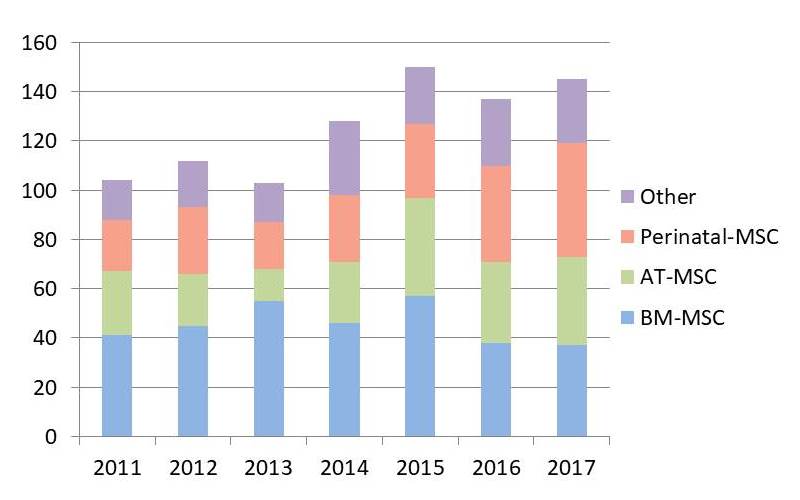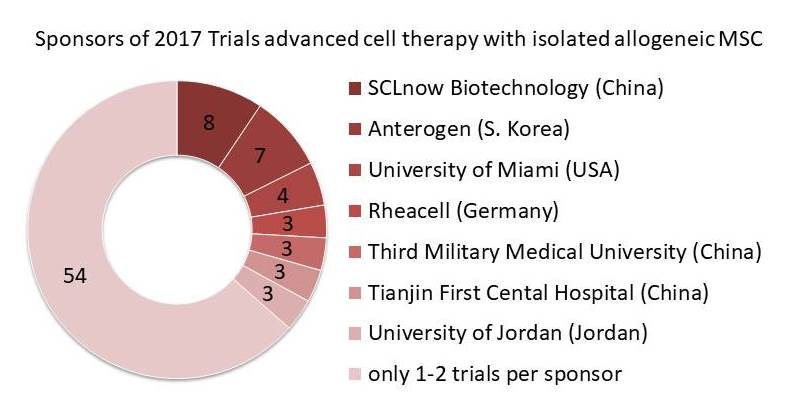CellTrials.org has released a new database that focuses on clinical trials performing advanced cell therapy with isolated MSC, from any source. The number of MSC trials registered each year has increased 50% in the past five years (2013-2017) from about 100 to 150 trials per year.

This bar graph shows the number of MSC trials by year and color-coded by source. Traditionally, MSC have been isolated primarily from bone marrow (BM-MSC) and adipose tissue (AT-MSC), and these continue to be the source for at least half the MSC trials each year.
During the past five years the fraction of MSC trials that rely on perinatal sources has risen from about 20% to 30%. In 2016 and 2017, trials with perinatal MSC outnumbered BM-MSC or AT-MSC. The perinatal sources include umbilical cord blood, umbilical cord tissue, and various types of placenta tissue. In this bar graph the category “Other” includes a variety of MSC sources, as well as trials with unknown MSC source or multiple cell types.
In 2017 we began to systematically track all the sponsors of MSC trials and the names of products being tested in the MSC trials. For that year, the sponsorship of MSC trials was 64% academia, 32% industry, and 4% collaborations between academia and industry.
In this pie chart we sort the 85 trials registered in 2017 that were testing an allogeneic MSC product. We display the names of those sponsors that had three or more trials. The majority of the MSC trials have diverse sponsors, but a few companies and institutions are heavily invested in this field.

We asked whether searches on the keyword “mesenchymal” are an accurate way to find MSC trials. Although the word “mesenchymal” is pretty unique, that fact that it appears somewhere in the description of a clinical trial does not guarantee that the trial relies on the action of MSC.
We tested trials in ClinicalTrials.gov that contained the keyword “mesenchymal” and were first posted between 1 Jan. 2011 and 31 Dec. 2017. We found 767 trials, and after examining each one we concluded that 630 trials actually rely on the action of mesenchymal cells, while the remaining 137 “mesenchymal” trials were false positives. The false positives included: trials in which the MSC are not fully isolated from their source (such as bone marrow concentrate or adipose stromal vascular fraction), trials that rely on the action of cytokines released by MSC but not the cells themselves, studies of MSC isolation procedures, and miscellaneous trials involving cell biology, drug testing, etc.

We find that only 82% of the trials returned by the keyword “mesenchymal” are actually trials that rely on the action of mesenchymal cells.
During 2017 the fraction of new MSC trials that were registered on ClinicalTrials.gov was 70%. Any trials that were cross-posted to ClinicalTrials.gov plus another registry were assigned to ClinicalTrials.gov. The remaining 30% of trials were posted on ten different registries, including three in the nation of Japan.
In conclusion, based on the 2017 data, any automated tools that collect MSC trials from ClinicalTrials.gov by keyword search will only find 70% of the world’s MSC trials and will only have 82% accuracy in the trials retrieved from ClinicalTrials.gov. This results in a net accuracy of 70% times 82%, or 57% accuracy of automated searches for MSC trials.